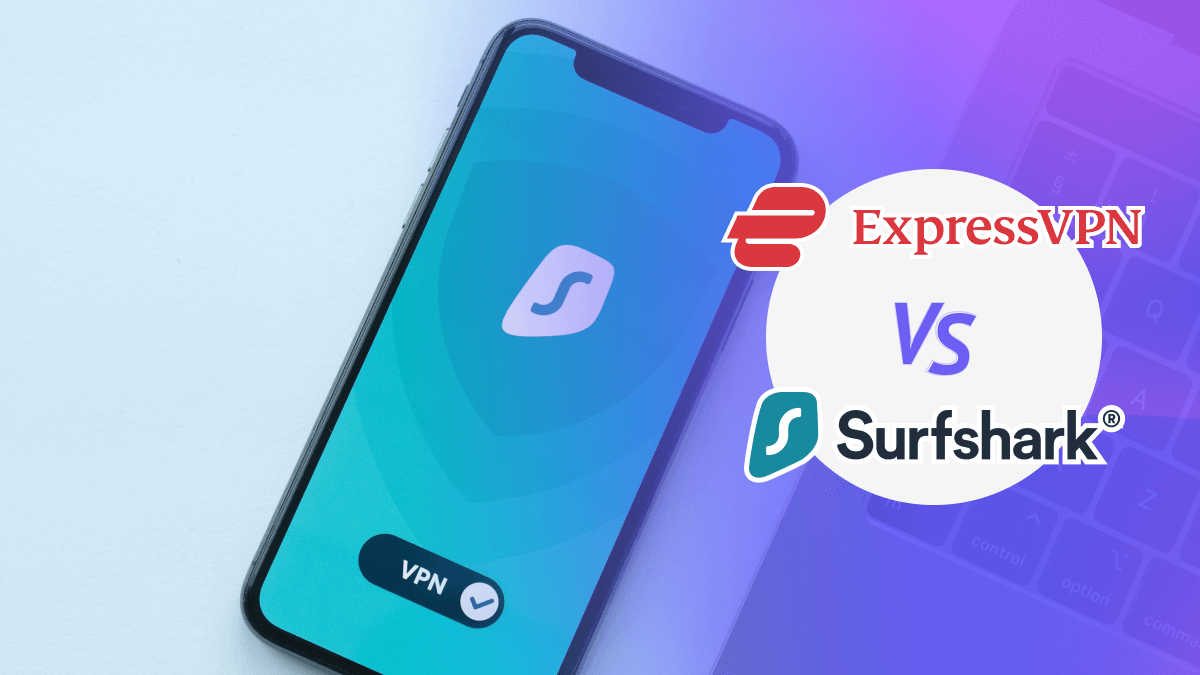
ExpressVPN vs Surfshark Compared in 2025
- Table of Contents
- ExpressVPN vs Surfshark: Comparison at a Glance
- My Expert Opinion: Is ExpressVPN or Surfshark Better?
- Security
- Privacy
- Key Features
- Speed
- Streaming Performance
- Server Network
- OS Support & Ease of Use
- Plans and Pricing
- Customer Support
- Conclusion: Why I Think ExpressVPN Wins Overall
- Methodology: How I Compared ExpressVPN and Surfshark
- Other VPN Alternatives I Like
- FAQ: Surfshark vs ExpressVPN
Quick Summary: ExpressVPN vs Surfshark
The main differences between ExpressVPN and Surfshark are that ExpressVPN is easier to use, has been more extensively audited, and has a better server distribution in more countries. Try it for free with its 30-day money-back guarantee.
Winner!
ExpressVPN and Surfshark are two of the best VPNs, with reliable security, fast connection speeds and the ability to unblock geo-restricted content worldwide. While these two providers share standard features, some of their key areas are worlds apart, as this ExpressVPN vs Surfshark review explores.
Surfshark is one of the cheapest VPNs, while ExpressVPN is one of the costliest. You can connect unlimited devices with Surfshark but only a maximum of eight with ExpressVPN. Both VPN services have malware blockers, and they have each been independently audited. Either VPN can unblock Netflix and other popular streaming platforms.
If you plan to start using a VPN and have narrowed your search to these two providers, read to the end to get all the information you need to make your choice.
- Money-Back Guarantee30 DaysWorldwide Server AmountOver 3,000 servers in 105 countries
- Money-Back Guarantee30 DaysWorldwide Server Amount1700+ Servers in 63 Countries
ExpressVPN vs Surfshark: Comparison at a Glance
We explore more details in our ExpressVPN review and Surfshark review, but here’s a glance at how the two VPNs compare based on different features.
| Features: | Wins | ExpressVPN | Wins | Surfshark |
|---|---|---|---|---|
| Security | ✅ | Lightway, IKEv2, OpenVPN, AES-256, ChaCha20, No leaks | ✖️ | WireGuard, IKEv2, OpenVPN, AES-256, ChaCha20, No leaks, Surfshark Alert, Alternative ID |
| Privacy | ✅ | Audited no-logs policy, RAM-only servers, No history of breach | ✖️ | Audited no-logs policy, RAM-only servers, No history of breach |
| Features | ✖️ | 8 devices, Kill switch, Split tunneling, Ad & malware blocker, Automatic obfuscation | ✅ | Unlimited devices, Kill switch, Split tunneling, Ad & malware blocker, Camouflage Mode, NoBorders Mode, Rotating IP |
| Speed | ✖️ | Average download speed: 22.5% unprotected | ✅ | Average download speed: 35.8% unprotected |
| Streaming | ✅ | Netflix, Hulu, Amazon Prime Video, Max, Disney+ | ✅ | Netflix, Hulu, Amazon Prime Video, Max, Disney+ |
| Server Network | ✅ | Over 3,000 servers in 105 countries | ✖️ | Over 3,200 servers in 100 countries, plus specialty servers |
| Plans & Pricing | ✖️ | $6.67/month for 15 months | ✅ | $2.29/month for 26 months |
| OS Support | ✅ | Windows, macOS, Linux, Android, iOS, Browsers, Smart TVs, Routers | ✖️ | Windows, macOS, Linux, Android, iOS, Browsers, Smart TVs, Routers |
| Support | ✅ | Live chat, Email, FAQs, Tutorials | ✖️ | Live chat, Email, FAQs, Tutorials |
| TOTAL WINS | 6 | 4 |
My Expert Opinion: Is ExpressVPN or Surfshark Better?
It’s a very close match, since Surfshark is better than ExpressVPN in several areas. It offers better connection speeds that are good for streaming and gaming, and you can connect unlimited devices simultaneously; ExpressVPN only allows up to eight. Surfshark also has more features like NoBorders Mode and Rotating IP to enhance your security and privacy.
But ExpressVPN notches a few more victories. This fast VPN has the industry’s best user interface, and it has been auditedmore times than most VPNs. ExpressVPN has never suffered a hack or breach in the past, and it has maintained this record for about a decade longer than Surfshark. It was also the first VPN to introduce RAM-only servers.
In addition, ExpressVPN is friendlier to new users, with better customer support and a much simpler setup process on routers. The features it does offer work every time, focusing on substance instead of flash. I’ll discuss all these factors and more in this detailed, head-to-head comparison.
I Recommend ExpressVPN For:
- New VPN users: It’s simple enough even for new users, but experienced users might chafe at its limited feature set.
- Streamers: ExpressVPN unblocks most geo-restricted content from anywhere and has reliable speeds to ensure buffer-free experiences.
- Users who need privacy: ExpressVPN has been heavily audited, and it has never had a security breach. Read our ExpressVPN review for more details.
I Recommend Surfshark For:
- People on a tight budget: Surfshark has one of the most affordable price plans, which is ideal for anyone on a tight budget who needs a reliable VPN.
- Large households: You can connect unlimited devices on a single account without an extra subscription — it’s one ring to rule them all.
- Fast speeds: Surfshark is quick; you can stream without buffering and play games without significant lags across multiple devices. For more information, read our Surfshark review.
Security
ExpressVPN and Surfshark both use AES 256-bit and ChaCha20 — two of the safest encryption types in the industry — as their default encryption algorithms. Let’s look at how else ExpressVPN and Surfshark compare in terms of security.
| Security Features: | ExpressVPN | Surfshark |
|---|---|---|
| VPN Protocols | Lightway, OpenVPN, IKEv2 | WireGuard, OpenVPN, IKEv2 |
| Encryption Types | AES-256, ChaCha20 | AES-256, ChaCha20 |
| Kill Switch | Yes | Yes |
| Private DNS | Yes | Yes |
| Ad & Malware Blocker | Threat Manager + Ad Blocker | CleanWeb |
VPN Protocols
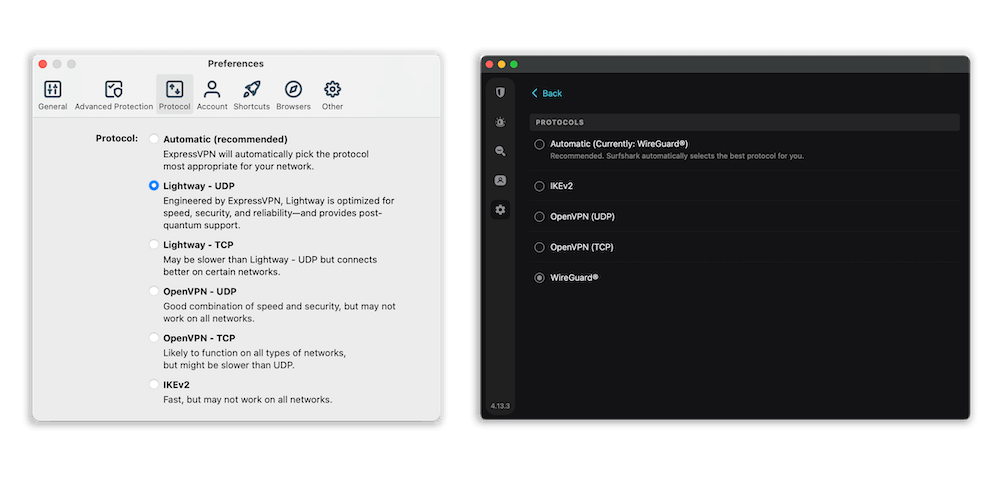
ExpressVPN has Lightway (UDP and TCP), OpenVPN (UDP and TCP) and IKEv2 (available on macOS and iOS). Surfshark has WireGuard, OpenVPN (UDP and TCP) and IKEv2. All these protocols are almost impossible to crack, even with brute-force hacking.
Surfshark doesn’t have a specialty protocol like Lightway, but this isn’t a big deal since the available options are just as reliable. For example, WireGuard was faster than Lightway UDP in my speed tests.
Encryption Tests
I conducted encryption tests for ExpressVPN and Surfshark using Wireshark to confirm whether they protect online traffic. The screenshot below shows the results.
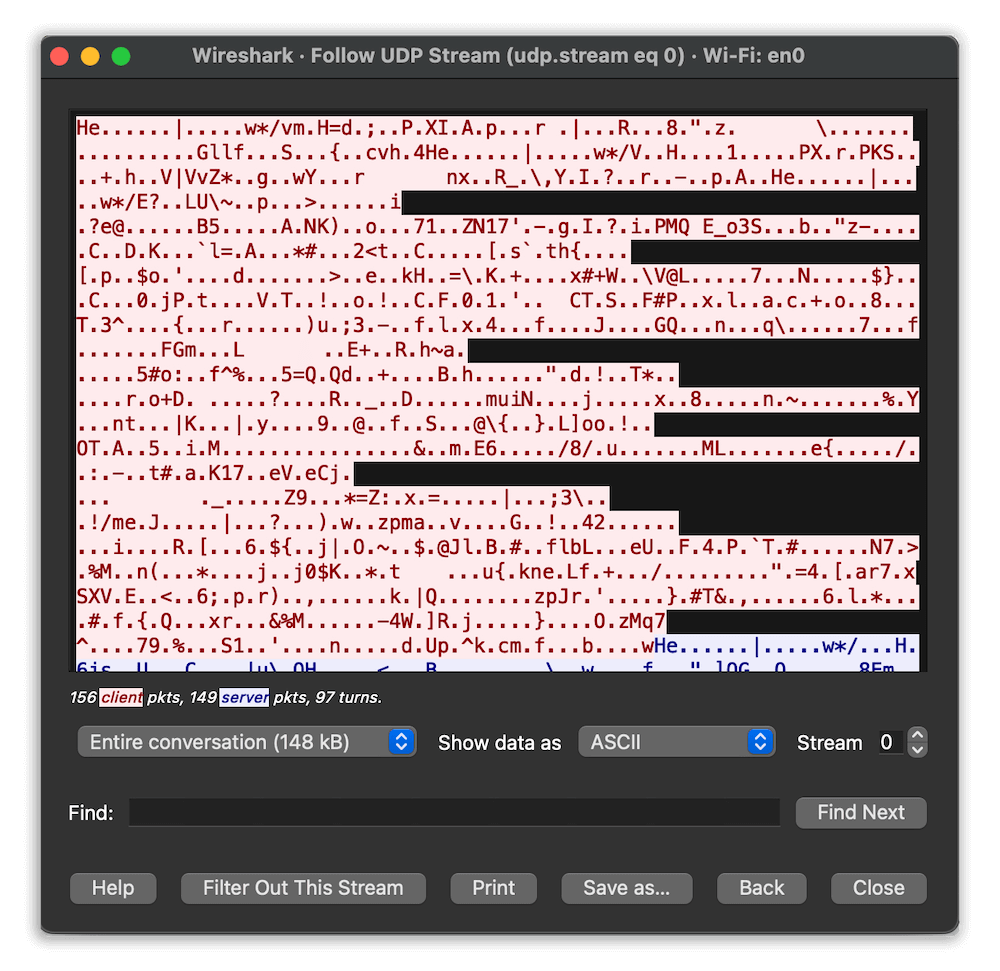
The unreadable jumble of texts and symbols you see above proves that the encryption works. That jumble is exactly what a hacker would see if they miraculously managed to intercept your VPN traffic.
Security Breaches
Neither ExpressVPN nor Surfshark VPN have suffered any security breaches in the past. This is good news for users, and not surprising considering how they keep upgrading their services. For example, both providers switched to RAM-only servers that get wiped periodically, leaving nothing that can be retrieved. I’ll explain the merits of this in the “privacy” section.
Other Security Features
Both Surfshark and ExpressVPN have a kill switch to prevent IP leaks. Once activated, the kill switch will shut down your internet connection if the VPN connection is interrupted. It will stay that way until the VPN connection is restored.
ExpressVPN and Surfshark both have features for blocking ads, malware and trackers. ExpressVPN has a Threat Manager for blocking trackers and malicious sites, an ad blocker for handling ads and a parental control feature for blocking adult sites. Surfshark has CleanWeb,which takes care of trackers and ads.
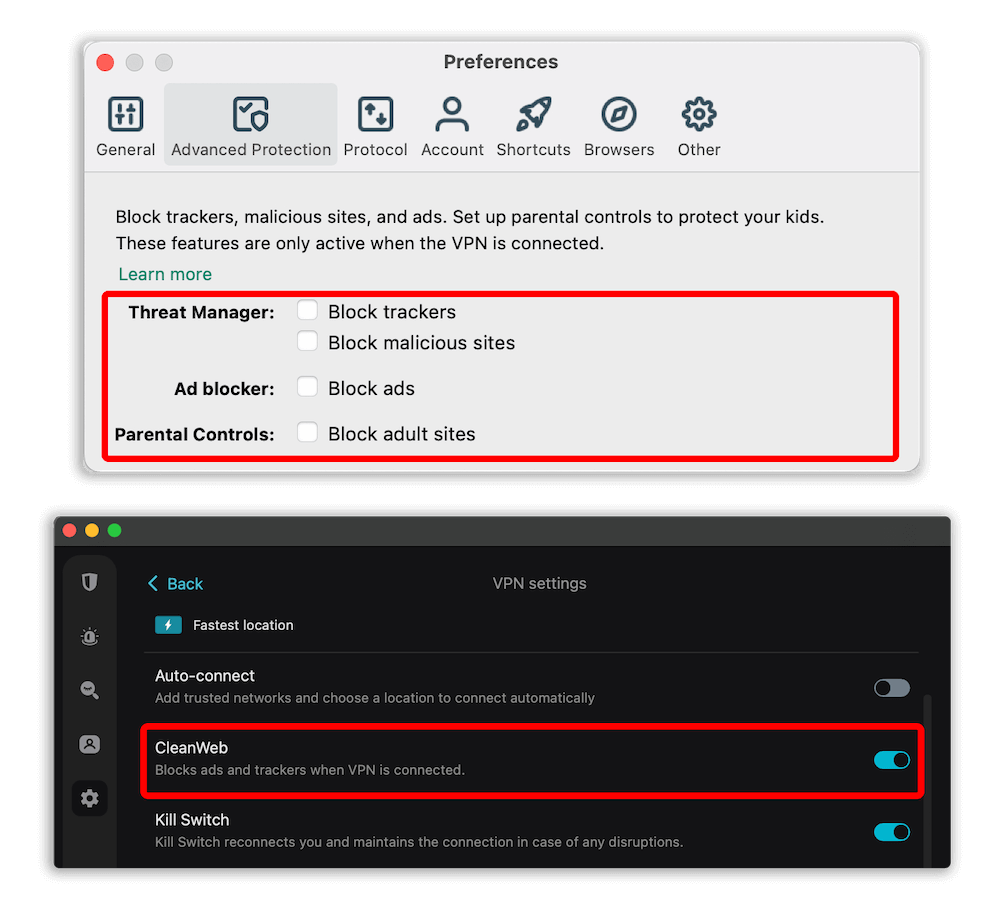
Winner: This was a tight race because both VPNs passed the encryption and DNS leak tests, and all their protocols are secure. However, ExpressVPN wins this round because it has been around longer without any incidents, and it started using RAM-only servers before Surfshark.
Privacy
Your data is a gold mine, and many online entities will try to sell it — most times, without your knowledge. ExpressVPN and Surfshark adhere to strict no-logs policies, and they have each been audited. Both are located in countries with tough data extradition laws, and they use RAM-only servers. Let’s see how all of these factors impact your online privacy.
RAM Servers
ExpressVPN has TrustedServer technology. This ensures that all of your browsing data is wiped clean with every reboot since each server runs on RAM only. Hard drives that store data can compromise your privacy if they’re ever seized by investigators. However, when everything runs on volatile memory, there’s nothing to retrieve in the first place.
Unlike Surfshark and other services, ExpressVPN has actually demonstrated the validity of its no-logs policy. When the Turkish government seized its servers during an investigation into the assassination of Russian Ambassador Andrei Karlov, they found no data on anyone since ExpressVPN doesn’t store anything.
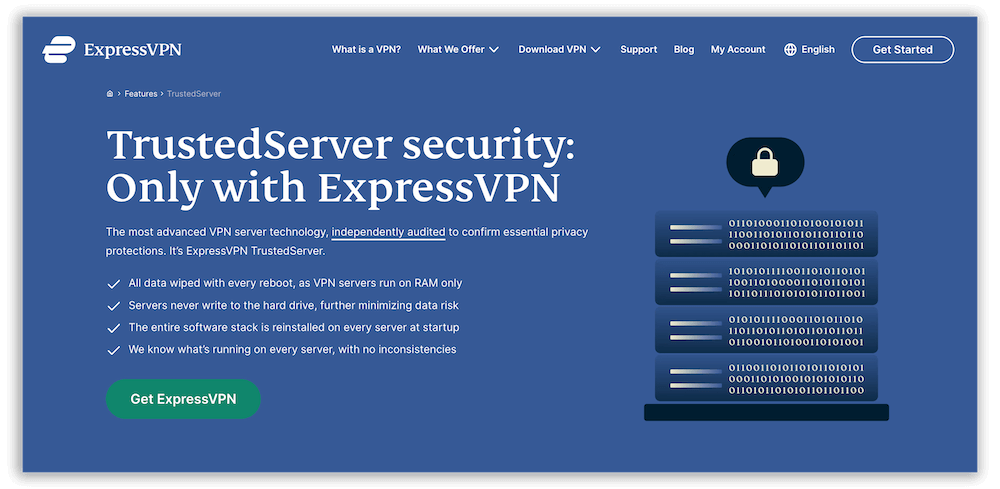
Surfshark has also switched to diskless servers. If anyone gets hold of these servers, they won’t find your browsing history, saved passwords or anything they can use to undermine your privacy. It’s like you were never there to begin with.
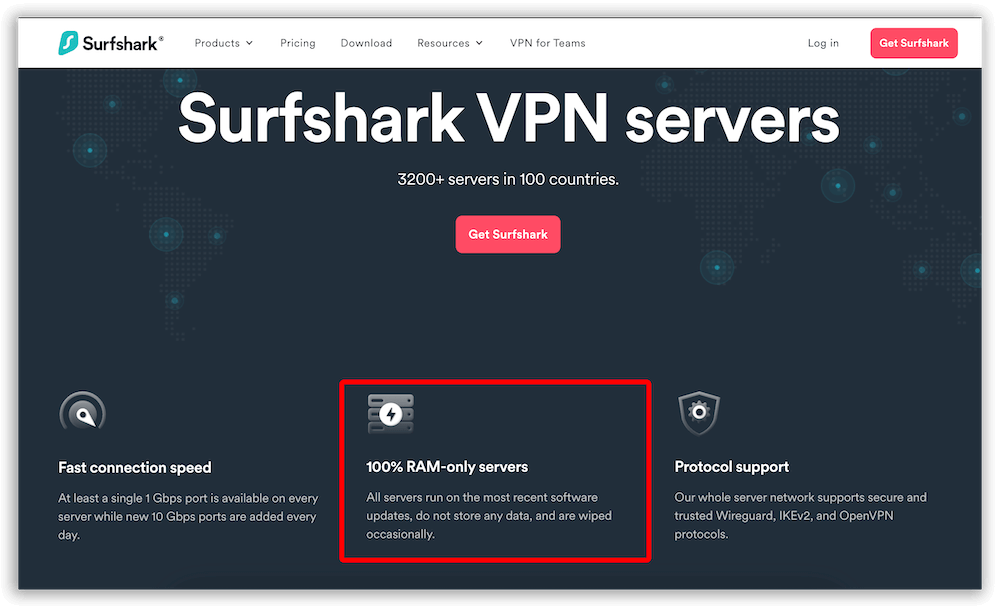
Additionally, ExpressVPN is based in the British Virgin Islands, where the complex legal process of securing data extradition provides consumers with some of the world’s strongest protections.
Surfshark is located in the Netherlands, which is part of the Nine Eyes surveillance alliance. This may allow the government to spy on consumer data without a warrant more easily. Since Surfshark’s servers don’t store any data, you can mostly rest easy — but it hasn’t faced an actual test like ExpressVPN did in Turkey.
Independent Audits
Between November 2018 and October 2022, ExpressVPN had 15 third-party audits of its browser extensions, mobile VPN apps, protocols and most importantly, its no-logs policy. Independent audits are the VPN version of a doctor giving you a clean bill of health, so getting 15 audits is almost like having a vaccine.
Like ExpressVPN, Surfshark has also been independently audited. Cure53 conducted a key audit in 2021 that focused on Surfshark’s server infrastructure, which was found to be secure. In 2023, Deloitte performed another audit that centered on the provider’s no-logs policy and found nothing alarming.
The only personal information that both VPNs store is your email address and payment details, which facilitate account creation, communication purposes and payment processing.
Winner: ExpressVPN is the winner of this category since it has had more audits than Surfshark. But overall, both VPNs are beacons of privacy.
Key Features
Split tunneling is available for ExpressVPN and Surfshark. You can use this feature to decide which apps and websites to route through the encrypted tunnel and which to leave out. Unencrypted apps and sites run slightly faster.
Both ExpressVPN and Surfshark offer split tunneling only on Windows and Android. Surfshark’s app, called Bypasser, can also be used on some routers, but only if they’re already configured with split tunneling support.
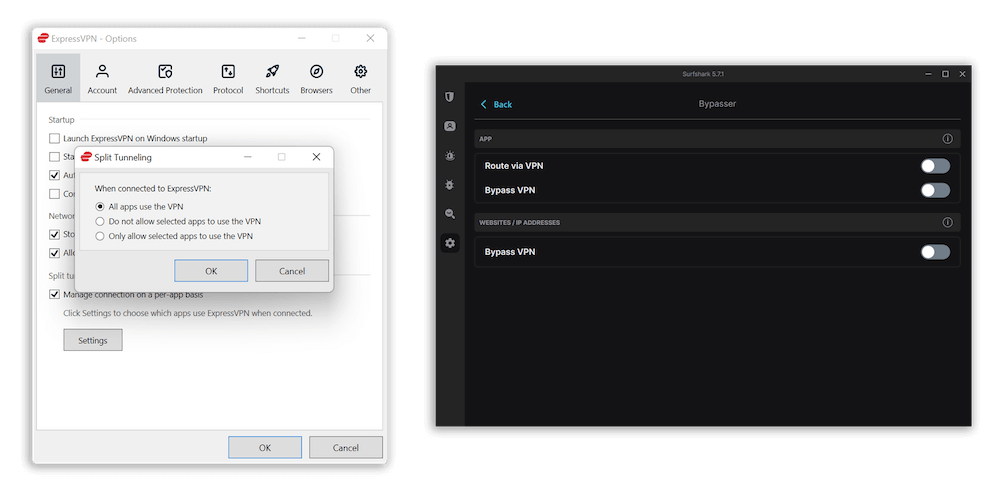
Both ExpressVPN and Surfshark offer obfuscation but in different styles. ExpressVPN has obfuscation built into its servers, so you’re automatically switched to an obfuscated protocol when the VPN detects VPN blocks.
Surfshark’s obfuscation is called Camouflage Mode, and it’s automatically activated when you switch to OpenVPN. However, you may experience slower speeds with Camouflage Mode — unlike ExpressVPN, whose obfuscation doesn’t switch you to a slower protocol.
Surfshark’s NoBorders Mode connects you to the best-performing servers that can get around any potential network restrictions. At the moment, NoBorders Mode is available on Windows and iOS only. It used to be offered on macOS, iOS and Android not long ago, but it hasn’t been included in recent updates.
Another helpful feature that Surfshark offers is Rotating IP,which changes your IP address occasionally without disrupting your VPN connection. Rotating IP makes it extremely difficult for anyone to track you.
Surfshark goes a step further by incorporating an Alternative ID feature. This creates a secure alternative email to create online accounts so you don’t have to deal with spam on your real email. Surfshark Alert protects your identity by alerting you when your email addresses appear in data breaches anywhere online.
Winner: While both VPNs have very helpful features, Surfshark offers more with Rotating IP, NoBorders Mode and Alternative ID, making it the winner of this round.
Speed
Speed is important for streaming, torrenting and gaming, and ExpressVPN and Surfshark are some of the fastest VPNs in the industry. I have used both VPNs for gaming, and NordVPN is the only alternative that has ever outperformed them — we have a full ExpressVPN vs NordVPN comparison if you’re curious.
I conducted speed tests for each VPN using different servers to prove that they aren’t all talk. Let’s have a look at how things panned out.
ExpressVPN Speed Tests
I’m in Kenya, and my unprotected speeds are usually capped at 50 Mbps. Below is a table showing how ExpressVPN performed.
| Location: | Latency (ms) | Download (Mbps) | Upload (Mbps) |
|---|---|---|---|
| 🇰🇪 Kenya (unprotected) | 10 | 50 | 40 |
| 🇺🇲 New York* | 304 | 29.40 | 16.76 |
| 🇿🇦 South Africa | 191 | 26.61 | 17.28 |
| 🇬🇧 United Kingdom | 204 | 26.34 | 27.90 |
| 🇯🇵 Japan | 281 | 24.07 | 14.91 |
| 🇦🇺 Australia | 228 | 18.90 | 11.53 |
| 🇧🇷 Brazil | 512 | 9.72 | 1.57 |
New York was the fastest server with 29.40 Mbps, while Brazil was the slowest at 9.72 Mbps. South Africa and the U.K. posted decent speeds as they’re closer to my location than Brazil, Japan and Australia.
The speed drops were significant, but at 29 Mbps, I didn’t struggle to stream content — although there were some lags when I played Fortnite on my Windows PC. If you’re here for P2P file sharing, see our guide on torrenting with ExpressVPN.
Surfshark Speed Tests
I replicated the same speed test parameters with Surfshark using the WireGuard protocol. Here are the results.
| Location: | Latency (ms) | Download (Mbps) | Upload (Mbps) |
|---|---|---|---|
| 🇰🇪 Kenya (unprotected) | 10 | 50 | 40 |
| 🇬🇧 United Kingdom* | 181 | 37.06 | 32.01 |
| 🇿🇦 South Africa | 288 | 34.76 | 20.34 |
| 🇺🇸 New York | 322 | 34.31 | 16.14 |
| 🇯🇵 Japan | 210 | 35.32 | 27.50 |
| 🇦🇺 Australia | 371 | 36.59 | 34.05 |
| 🇧🇷 Brazil | 445 | 36.75 | 34.11 |
Surfshark hit the homerun when it came to speed. It was significantly faster, to the point where the slowest server (New York) was still quicker than ExpressVPN’s fastest server. Even server locations that were further away from me — like Brazil and Australia — were fast. Streaming, gaming and torrenting were better on Surfshark.
Winner: Surfshark is the outright winner of this category, as it was faster than ExpressVPN across all the servers I tested.
Streaming Performance
ExpressVPN and Surfshark unblocked every major streaming platform I tried right away. I comfortably changed my location on Netflix, Hulu, Amazon Prime Video, Max, Disney+ and more. The only key difference between the two VPNs was that Surfshark was smoother and handled 4K streaming better than ExpressVPN.
| Platform: | ExpressVPN | Surfshark |
|---|---|---|
| Netflix | Yes | Yes |
| Hulu | Yes | Yes |
| Amazon Prime Video | Yes | Yes |
| Max | Yes | Yes |
| Disney+ | Yes | Yes |
You can use both VPNs on streaming devices like Samsung TVs and LG TVs, which don’t support VPN installations, through the “smart DNS” feature — more on this in the OS support section. Suffice it to say that both ExpressVPN and Surfshark are on our best VPN for streaming roundup for a reason.
Winner: This was a tie. Both VPNs easily unblocked geo-restricted content without problems.
Server Network
A VPN’s ability to execute its role optimally depends on the quantity and quality of its servers, and Surfshark and ExpressVPN meet these requirements sufficiently. ExpressVPN has over 3,000 servers in 105 countries, while Surfshark has more than 3,200 servers in 100 countries.
ExpressVPN Server Spread
Below is a table showing how ExpressVPN’s servers are spread around the world.
| Region | Countries | Locations |
|---|---|---|
| North America | 14 | 40 |
| South America | 9 | 10 |
| Europe | 47 | 65 |
| Asia | 25 | 32 |
| Africa | 6 | 6 |
| Oceania | 2 | 8 |
| Middle East | 2 | 2 |
The server distribution is uneven in most regions, with Europe, North America and Asia hogging most of the servers. South America and Africa come next, while the Middle East region has the fewest locations. Six locations in Africa are still impressive compared to many VPNs, which rarely have more than two servers.
Surfshark Server Spread
Surfshark’s server network is superior to ExpressVPN’s and also comes with specialty servers. Static IP servers give you the same IP address every time you connect, but you must share them with other users. Alternatively, you can get a dedicated IP that is exclusively assigned to you at an added cost. Here’s how these servers are distributed around the world.
| Region | Countries | Locations |
|---|---|---|
| North America | 7 | 29 |
| South America | 9 | 9 |
| Europe | 46 | 58 |
| Asia | 24 | 25 |
| Africa | 6 | 6 |
| Oceania | 2 | 6 |
| Middle East | 3 | 3 |
Surfshark’s server distribution mirrors what ExpressVPN offers, with a high concentration of locations in North America, Europe and Asia. There are six African locations, and Oceania brings up the rear with just two countries and six locations.
Winner: ExpressVPN is the winner because it has servers in 105 countries, compared to Surfshark, which only offers locations in 100 countries. To be clear, though, both of these networks are in the top echelon of all VPNs.
OS Support & Ease of Use
You can use Surfshark and ExpressVPN on Windows, macOS, Linux, iOS, Android, Android TV, Fire Stick and Apple TV. Each provider offers browser extensions for Chrome, Edge and Firefox. Both VPNs are also compatible with multiple routers.
ExpressVPN stands out for being the only VPN to offer a preinstalled router. It’s called ExpressVPN Aircove, and it comes complete with a dedicated app for controlling it.
ExpressVPN and Surfshark also work on Samsung and LG smart TVs through the “smart DNS” feature. However, both are limited to U.S. content only — there’s no encryption involved, so you should expect faster speeds.
Ease of Use
ExpressVPN and Surfshark are easy to use. You can connect to any server with a single click and use the search function to find the exact server you want. However, I love how ExpressVPN groups its servers based on continents. Additionally, you can connect a maximum of eight devices simultaneously.
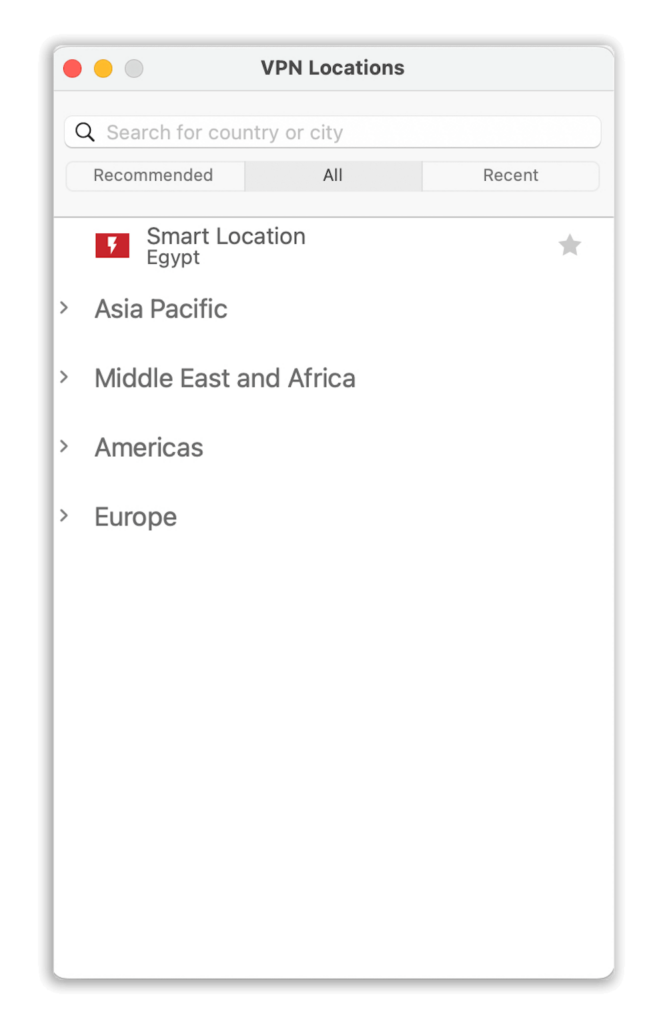
Surfshark has a search function and also lists its servers in an orderly manner that’s easy to navigate. It displays the most recent servers you’ve used in case you want to dive back in.
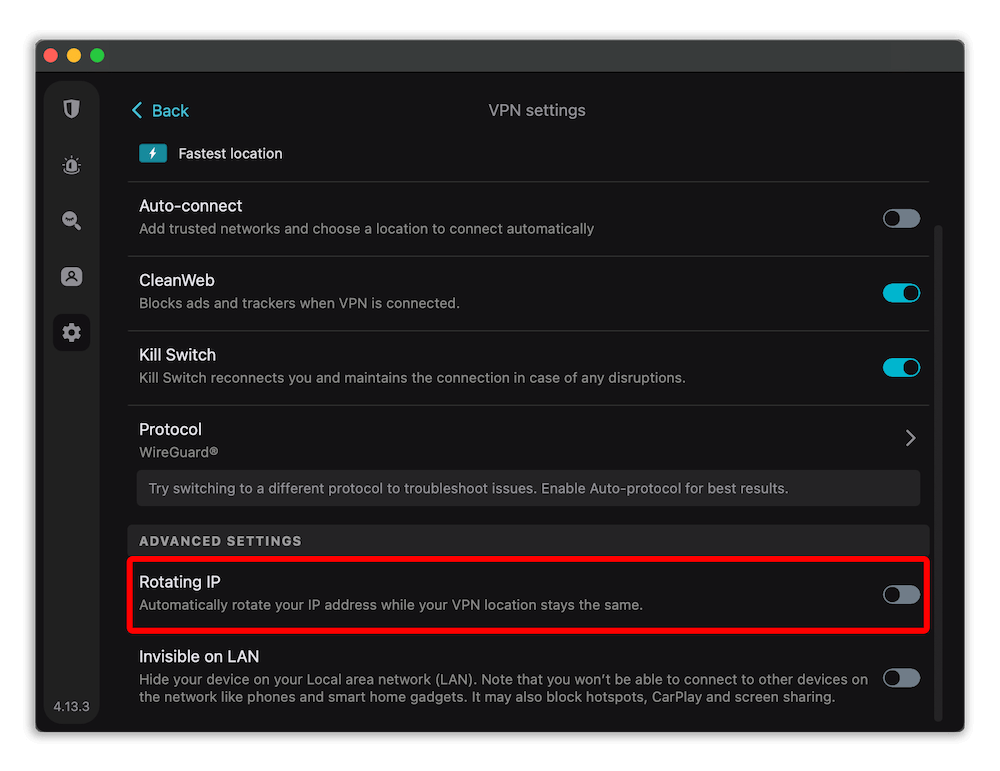
Surfshark is also the best VPN for multiple devices, letting you connect unlimited devices simultaneously with a single account. It’s very helpful if you have friends and family who need to secure their connections without paying extra.
Winner: ExpressVPN won this category as the app is easier to use across all platforms. It’s also the only VPN with a router that comes with the VPN preinstalled and an app for controlling it.
Plans and Pricing
Regarding pricing, ExpressVPN and Surfshark lie on two extreme ends of the pricing spectrum. ExpressVPN is one of the costliest providers, while Surfshark is one of the cheapest (but it still has a very expensive monthly plan). Both have free VPN trials that you can use to see how well they work on your devices.
ExpressVPN Pricing
ExpressVPN has three price plans. The 12-month option offers the best deal at $6.67 per month with three months free. The next best deal is the six-month option, which costs $9.99 per month, followed by the monthly plan for $12.95. A 30-day money-back guarantee covers every ExpressVPN plan, so you can try it risk free.
Surfshark Pricing
Surfshark Starter is the cheapest package, with three price plans. There’s the 24-month plan, which goes for $2.29 per month with two extra months. The next cheapest plan is the 12-month option at $2.99 per month with two extra months. Finally, you can subscribe to the monthly plan for $15.45. A 30-day money-back guarantee covers all the plans, so you can try it before committing.
Winner: Surfshark wins this round for having the cheapest long-term price plans despite having a very costly monthly plan.
Customer Support
ExpressVPN has an online help center, a direct support email and a live chat option. There’s an FAQ section with questions and detailed answers addressing the most common issues you may encounter. The live chat response was fast; I could always see the chat bubble floating in the bottom-right corner of my screen.
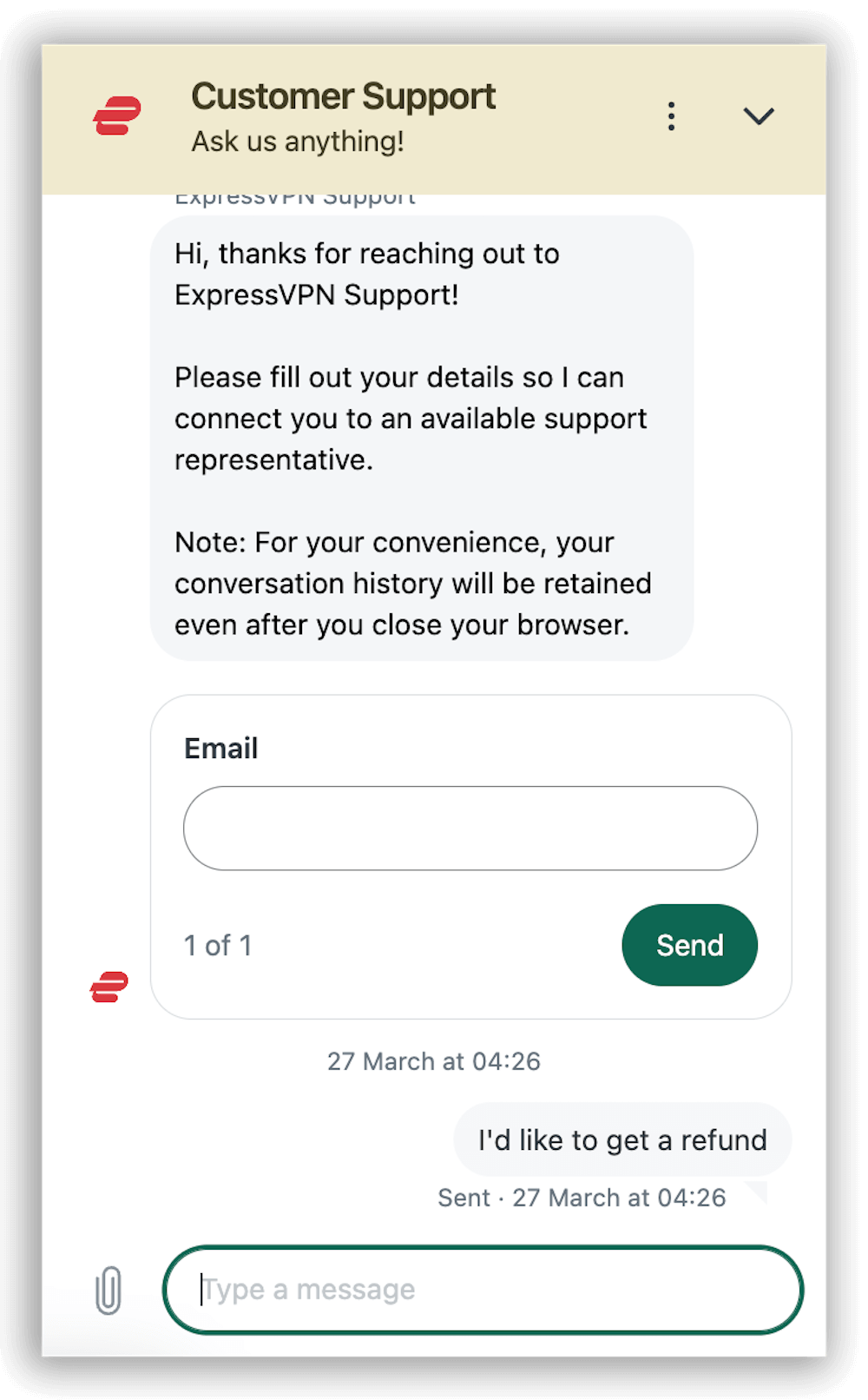
Surfshark’s help center has an FAQ section with many well-answered questions. If you can’t find what you need there, you can contact support via email or live chat. However, unlike ExpressVPN, the live chat option doesn’t float around the homepage. I had to scroll to the bottom and tap on the help center to access it. Still, the responses were just as quick.
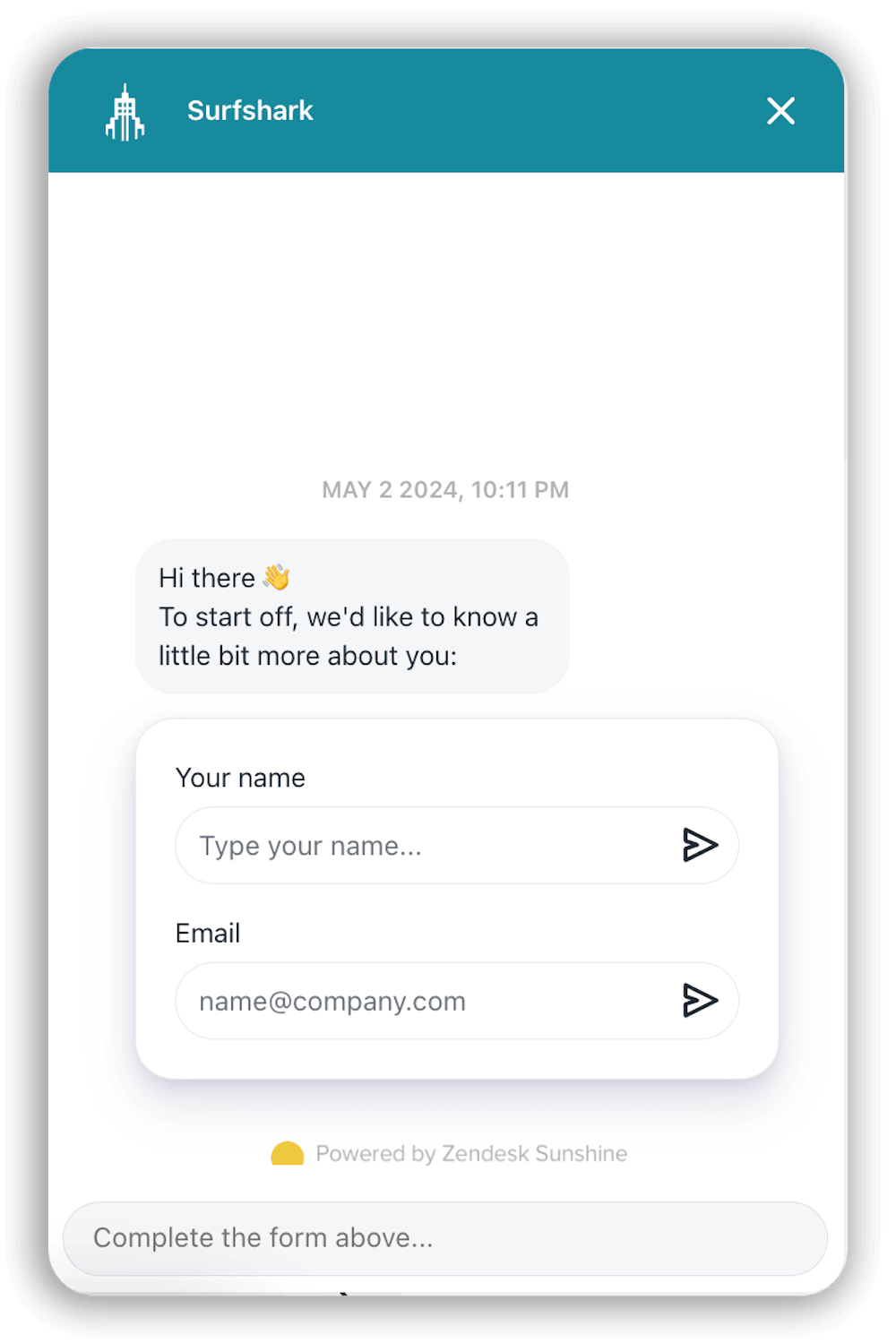
Winner: These two VPNs offer live chat, email support and helpful FAQ sections. However, ExpressVPN wins this round because its live chat option is much easier to access than Surfshark’s.
Conclusion: Why I Think ExpressVPN Wins Overall
ExpressVPN clinches the win,even though Surfshark puts up a very strong showing. Surfshark is generally faster, and in the long run, it’s cheaper too. But ExpressVPN’s dedication to its core service shows through: It’s a near-perfect app, while Surfshark comes across as more cluttered and less focused.
Separating these two VPNs is hard, especially for someone who has experience using virtual private networks. From another perspective, the choice comes down to pricing. Surfshark’s long-term price plans are hard to beat, while ExpressVPN has the cheaper monthly plan.
Methodology: How I Compared ExpressVPN and Surfshark
When pitting ExpressVPN against Surfshark, I paid close attention to the key features and functionalities that define a virtual private network. Here’s the methodology I used.
Security
I looked at the type of encryption used and the security levels offered by each available protocol. I also tested each VPN to see if the encryption and DNS leak protection worked as they should.
Privacy
I needed to know if both VPNs protect user data. This can only be confirmed with independent auditing, which ExpressVPN and Surfshark have already passed. RAM servers are also important since they’re periodically wiped, ensuring your data can never be retrieved.
Key Features
I looked at the availability of features like split tunneling, ad blockers and obfuscation. These features come in clutch for desperate moments, like when you’re on a network that blocks VPNs.
Speed
Encryption comes at a cost to your speed, so ExpressVPN and Surfshark are constantly upgrading their servers to compensate for that deficit. I tested both VPNs, and while their speeds were impressive across the board, they weren’t the same.
Streaming Performance
VPNs let you access geo-restricted content on streaming services, and ExpressVPN and Surfshark unblocked different Netflix libraries with ease. I could also access Hulu, Prime Video, Max, Disney+ and more.
Plans and Pricing
Surfshark and ExpressVPN have different price plans that cater to everyone’s needs, and each provider offers a 30-day money-back guarantee.
Servers and Location
I looked into the distribution of their servers, especially in regions like Africa and the Middle East, which always need more coverage.
Usability
A VPN is only as good as its ease of use. I tried locating servers on ExpressVPN and Surfshark, and I checked how hard it was to activate essential features like the kill switch and ad blockers.
Other VPN Alternatives I Like
ExpressVPN and Surfshark are just two of the capable VPNs that you can use. Here are some alternatives you can turn to if these two aren’t your cup of tea.
NordVPN — Fast Connection Speeds
You can always go with NordVPN if you want great streaming, torrenting or gaming speeds. NordVPN has a large server network that includes obfuscated servers, double VPN and Onion Over VPN servers — more on that in our NordVPN review.
Proton VPN — Best Free VPN
Surfshark is delightfully affordable but still not free; frankly, the monthly plan is abnormally expensive. Proton VPN is a good alternative, as it has a free version with unlimited data, servers in five locations and reliable security. Read our Proton VPN review for more information.
CyberGhost — Largest Server Network
CyberGhost has over 11,000 servers, which minimizes the bottlenecks caused by overcrowding. On top of that, it comes with specialty servers for streaming, gaming and torrenting, and it’s among the most affordable services. This CyberGhost review has all the juicy details.
FAQ: Surfshark vs ExpressVPN
Surfshark vs ExpressVPN vs NordVPN: Which Is Better?
Surfshark is better if you’re looking for an affordable VPN. ExpressVPN is better for dealing with VPN blocks without affecting speeds, and NordVPN excels at giving you the best speeds and most reliable security options.Is Surfshark Better Than ExpressVPN?
Surfshark is faster and cheaper than ExpressVPN, which is enough for most people with simple VPN needs. However, both VPNs are just as good at offering security, unblocking content and providing stable connections.Is ExpressVPN the Best VPN?
ExpressVPN is one of the best in the VPN industry. The parameters for declaring a VPN the best vary from individual to individual based on personal preferences, but it is definitely among the best options.

Leave a Reply